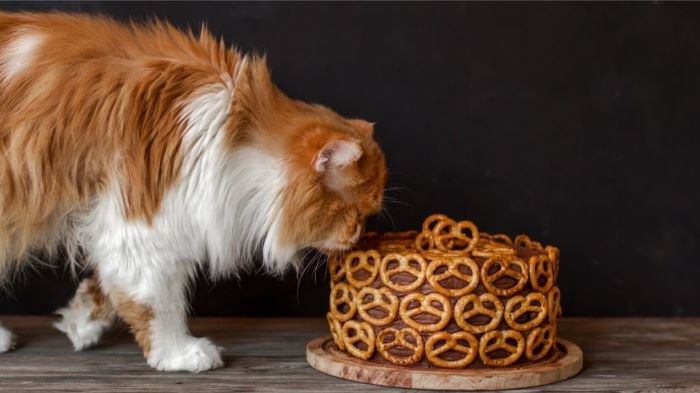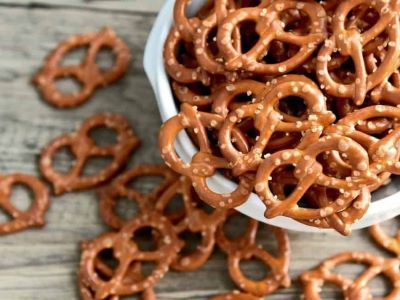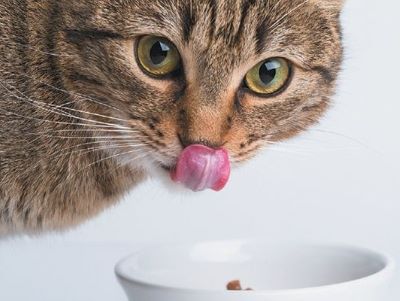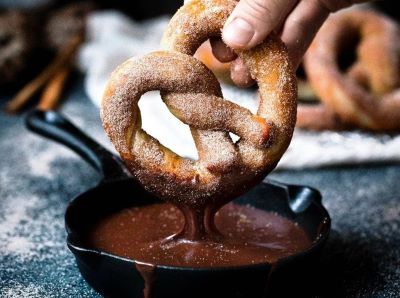Cats are famous for their unique dietary preferences and requirements.
While they are obligate carnivores, meaning their bodies are designed to thrive on a meat-based diet, the question surfaces that Can cats eat pretzels?

Pretzels, with their crunchy texture and savory flavors, and sweet glaze may tempt us to share them with our cats.
However, it’s important to understand their nutritional values and potential risks associated with feeding pretzels to cats.
Can Cats Eat Pretzels? Overview of Cat’s Diet
Cats have evolved as natural hunters. “They require high levels of animal protein, essential amino acids, and specific vitamins and minerals. One vital nutrient for cats is taurine, which is found abundantly in animal tissues[1].”
“Taurine deficiency in cats can lead to severe health issues, including heart and vision problems. Therefore, a balanced and species-appropriate diet is crucial for their overall health”, confirms an expert at PetMD.
Due to the high carbs content in pretzels cats may also experience digestive issues such as vomiting and diarrhea which may disrupt their sensitive gastrointestinal systems.
Unlike humans and some other animals, cats lack certain necessary digestive enzymes which help to break down and utilize plant-based nutrients efficiently.
So can cats eat pretzels? Yes, Cats can eat pretzels but always in moderation. Read pretzel labels carefully to ensure that no harmful ingredients are present before considering sharing them with your feline companion.
Pretzels: Potential Risks
Besides being tasty pretzels also contains some ingredients which may be hazardous to a cat’s health. Here are some of them:
1. Salt
Feeding salty pretzels to cats can pose several risks to their health. Pretzels have high salt content, which can be detrimental to a cat’s health.

The high salt content in pretzels may cause electrolyte imbalances, leading to dehydration, increased thirst, and potential kidney problems.
It’s important to remember that cats have unique dietary requirements, and indulging them with salty pretzels can have adverse effects.
Opting for feline-appropriate treats is a safer choice for their overall well-being.
2. Seasoning and Spices
Seasoning and spices found on pretzels can be potentially risky for cats. Some pretzels may contain ingredients that are toxic to cats.
For example, garlic or onion powder, often used for flavoring, can lead to anemia and damage to a cat’s red blood cells. Cats lack the specific enzymes necessary to metabolize these substances effectively[2].
Therefore, it’s crucial to avoid sharing pretzels seasoned with such ingredients with your feline companion.
To ensure your cat’s safety, it’s best to stick to treats specifically formulated for cats.
3. Sweeteners
Sweeteners and chocolate found on pretzels pose significant risks to cats.
Renee Schmid from VCA Hospitals says, “Sweeteners like xylitol, commonly used in sugar-free products, can be highly toxic to cats, leading to a rapid drop in blood sugar levels and potential liver damage.”
Some pretzels also have chocolate on them. Chocolate contains caffeine and an ingredient called theobromine, both of which are dangerous to cats; in large enough amounts, it can be fatal.
Swallowing chocolate can cause symptoms such as vomiting, diarrhea, increased heart rate, tremors, and even seizures in cats.

It’s crucial to keep pretzels with sweeteners or chocolate away from cats and ensure they don’t have access to these potentially harmful ingredients.
If accidental ingestion occurs, immediate vet attention is necessary.
4. Choking Hazard
The dry and crunchy texture of pretzels makes them prone to breaking into small, hard pieces that can easily get stuck in a cat’s throat or cause a barrier in its digestive system.
Cats have a delicate swallowing mechanism and may not be able to handle large or irregularly shaped pretzel pieces, increasing the risk of choking.
Ensuring that your cat’s snacks are appropriate in size and texture is crucial for their safety and health.
Snacks Cats Can Eat? Safe Alternatives
There are several safe alternatives to pretzels that you can offer to your cat. Here are a few options:
- Freeze-dried meat treats: These treats are made from real meat, which is a good source of animal protein for cats. They are usually light in weight, crunchy, and packed with many flavors, making them a great snack for your cat.
- Cooked chicken or fish: Feeding small, boneless pieces of cooked chicken or fish can be a healthy and enjoyable alternative to pretzels. Ensure the meat is properly cooked, free of seasoning or spices, and served in appropriate portion sizes.
- Cat-specific treats: Many pet stores offer a variety of treats specially formulated for cats. Look for treats that are made with good-quality ingredients, no harmful additives, and are designed to meet the nutritional needs of cats.
- Catnip or cat grass: Some cats enjoy the stimulation of catnip or nibbling on cat grass. These natural options can provide entertainment and satisfy their chewing instincts without compromising their health.

Remember, when introducing any new treats or alternatives into your cat’s diet, it’s always a good idea to monitor their response and consult with a vet if you have any concerns or questions about specific dietary requirements for your cat.
Are Pretzels Safe for Kittens?
It may seem surprising, but the age of a kitten or young cat can significantly impact what they can safely consume.
Kittens have more delicate stomachs compared to adult cats, and their developing bodies may not be fully prepared to handle pretzels.
Additionally, kittens require essential nutrients to support their growth and overall development, which pretzels lack completely.
In other words, pretzels offer no nutritional value for young cats and can potentially upset their sensitive digestive system.
It’s important to provide appropriate kitten-specific food and treats that fulfill their specific nutritional needs during this crucial stage of their life.

FAQs
Can Cats Eat Salty Food?
If they consume too much, salt can make cats sick. A cat’s normal body fluid level is between 0.9 percent and 1 percent sodium chloride (salt). If a cat eats large amounts of salt, it may have problems with excessive sodium levels in its bloodstream. The excessive salt content may cause electrolyte imbalances, leading to dehydration, increased thirst, and potential kidney problems.
Can Cats Eat Popcorn?
The short answer is: yes and no. Popcorn by itself is non-toxic to cats, but can also be a choking hazard and other health-related issues if made with butter and salt. Popcorn is not on the ASPCA list of toxic foods, but since most popcorn is covered in butter and salt, that can present many health issues down the road.
Can Cats Eat Ice Cream?
The quick answer: Not recommended. A small amount of ice cream likely won’t make your cat sick, but larger amounts can cause tummy issues, and ice cream offers no nutritional benefits to a cat. Ice cream consists mostly of fat and carbohydrates.
Can Cats Have Yogurt?
So remember, nonfat plain yogurt is usually safe and healthy for cats and dogs to eat as a fun snack — just check the nutrition label first to make sure it doesn’t contain a dangerous ingredient, like xylitol. And for even more power-packed benefits, consider adding a daily probiotic to their regimen.
Can Cats Eat Chocolate?
In short: no! Chocolate contains caffeine and an ingredient called theobromine, both of which are dangerous to cats; in large enough amounts, it can be fatal. These compounds are stimulants, and when absorbed in a cat’s body, it becomes highly toxic.
What Human Foods Can Cats Eat?
Fish, Meat, Poultry, beef, and other meat is a natural option for your little carnivore. Cheese, Bananas, Berries, Melon, Carrots, Rice. They can have most things but remember moderation is the key and always consult with your vet for guidance on which food to share with your cat.
Can Cats Eat Eggs?
Yes, cats can eat eggs. Fully cooked eggs are a great nutritional treat for cats. Eggs are packed with nutrients, like amino acids, which are the building blocks to protein, and they’re also highly digestible. Scrambled, boiled, however, you choose to prepare them is fin. Always remember to feed them eggs in moderation.
Are Junk Foods Okay for Cats?
Like humans, cats need a diet based on whole, unprocessed foods, but that doesn’t mean they can make sound nutrition choices on their own. Processed foods, with their excess fat, sugar, and/or salt, do not have a place in a cat’s diet. This can lead to digestive issues in cats.
Summary
Taking care of your cat’s health should be your top priority, especially when it comes to their diet. Pretzels, with their salty and carb-loaded nature, aren’t the best choice for our feline friends.
If you’re unsure about which treats are safe for your cat, it’s like a treasure hunt—consult with a vet! They’ll give you expert advice on what snacks will keep your cat purring with joy while staying healthy.
Always remember moderation is the key, and your vet is the purr-fect guide to ensure your furry companion’s well-being!
Reference:
- Li, P., & Wu, G. (2023, February 21). Amino acid nutrition and metabolism in domestic cats and dogs. Journal of Animal Science and Biotechnology- NIH.
- Anemia. (2021, June 17). Cornell University College of Veterinary Medicine- CUVM.

